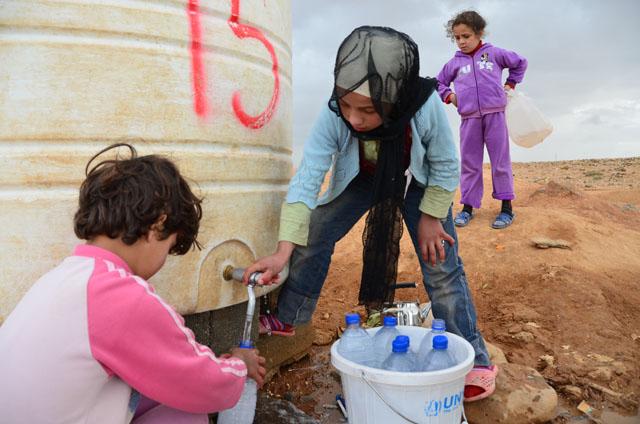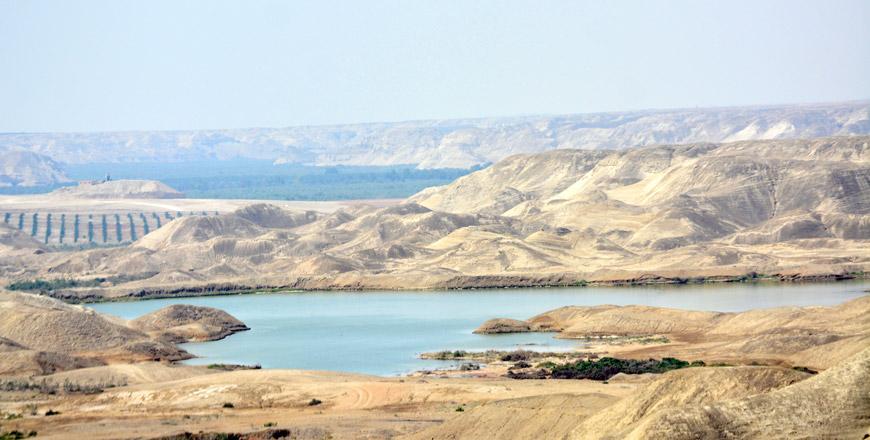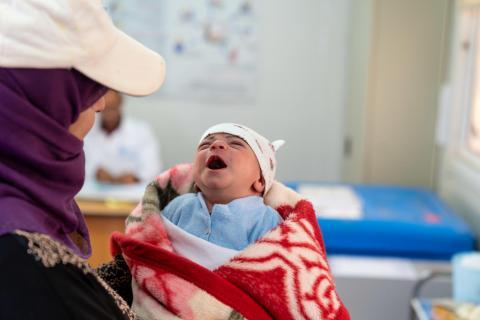You are here
'Only 8% of $750 million water response plan covered by int'l community'
By Hana Namrouqa - Apr 27,2015 - Last updated at Apr 27,2015

DEAD SEA — The Water Ministry on Monday launched its $750 million water, sanitation and hygiene response plan for Syrian refugees and host communities.
The 2015-2017 Jordan Response Plan for Water, Sanitation and Hygiene, prepared by the ministry and UNICEF, seeks to enhance the capacity of the government and host communities to meet the increased demand for water and sanitation services.
The three-year plan was launched at the National Conference on Water and Sanitation, organised by the ministry in cooperation with UNICEF.
During the event, Water Minister Hazem Nasser said that Jordan presented its response plan to the international community last month in Kuwait to raise funds for its implementation.
“A total of $750 million is needed to sustain water and sanitation services alone for Syrian refugees and host communities. So far, only 8 per cent or $25 million of the required amount has been secured,” Nasser added.
He stressed that the sustainability of water and sanitation accessibility will be at stake unless funds are received from the international community.
“If the required funds [$750 million for 2015-2017] are not secured, there will be a negative impact on Syrian refugees’ health, security and environment. In addition, tensions may arise between refugees and host communities,” the minister warned.
Between 2013 and 2014, the international community extended $180 million in un-programmed grants to the ministry. The funds were directed towards improving water and sanitation services to Syrian refugees and host communities, particularly in the Mafraq and Irbid governorates, according to Nasser.
“The magnitude of the water and sanitation problem is very huge, and we might not notice a substantial improvement in many areas, but the implemented projects are keeping the problem of water and sanitation from reaching the level of a crisis.”
As the conflict in Syria enters its fifth year, Jordan is hosting 1.4 million Syrians, of whom some 650,000 are refugees and 85 per cent live among host communities, while the remainder live in camps, according to the response plan.
The addition of hundreds of thousands of Syrian refugees to an already vulnerable water, sanitation and hygiene situation has resulted in severe pressure on the entire system of these services in Jordan.
The multiplicity of risks due to the Syrian crisis has also impacted the lives and subsistence of nearly 3 million vulnerable Jordanians who host the Syrian refugees in their communities and neighbourhoods, according to the response plan.
Since the breakout of the Syrian crisis in 2011, demand for water has increased by 40 per cent as supply remains scarce, Nasser underscored, noting that each Syrian refugee costs the country $600 annually, while the total cost incurred annually by the government for hosting them stands at $360 million.
“Refugees’ daily per capita share of water stands at 40 litres provided via wells. Moreover, 2,500 cubic metres of wastewater is generated daily at the Zaatari Refugee Camp, which requires $2,500 per day for its handling and treatment,” Nasser indicated.
The Jordan Response Plan for Water, Sanitation and Hygiene focuses on a refugee response and resilience strengthening project that links resilience objectives with short-term refugee assistance, particularly in communities hosting Syrian refugees.
UNICEF Representative to Jordan Robert Jenkins said the Kingdom is one of the most water scarce countries in the world, highlighting that the strain of hosting over 620,000 Syria refugees is beginning to show, especially in basic service sectors such as water and sanitation.
For the last three years, UNICEF has been closely collaborating with the Water Ministry and partners in providing critical water, sanitation and hygiene services to families and individuals in camps and communities, Jenkins said at the conference, underscoring that the biggest challenge for the agency was sustaining these lifesaving services, while at the same time, protecting the environment.
“Our collective efforts in supporting the government has contributed to certain things 'not happening' that we should be all be proud of. We have had no epidemic of cholera or other water-related diseases in the country despite the large influx of people,” the UN official noted.
He called for continuing efforts to innovate to reduce costs, sustain services, and ensure that the most vulnerable children and families have access to basic lifesaving services, noting that providing clean water and safe sanitation is critical to the well-being of all children and their families in Jordan.
Related Articles
AMMAN — The Ministry of Water and Irrigation only secured 19 per cent of funds required to sustain water and wastewater services to Syrian r
Random pumping of underground water has exceeded the safe yield, particularly after 2011 when the Syria crisis started, according to recent studies on aquifers in Jordan.
AMMAN — The Government of Australia has announced a new contribution of $3 million to support UNICEF’s work to keep children healthy, learni













